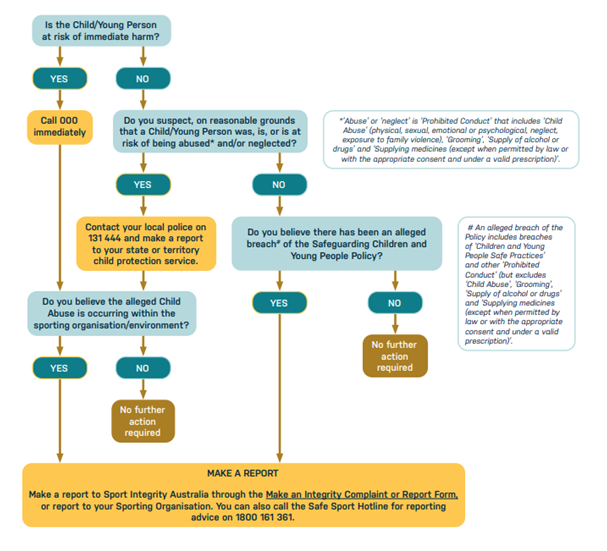Safeguarding for Volunteers
Creating safe sport for all is everyone’s responsibility. We all have a role to play. Volunteers must know their roles and responsibilities to keep children and young people safe. If you see or hear something, say something.
Child Safeguarding
- All children and young people have the right to feel safe and be protected from abuse, harm, and neglect in sport.
- It is everyone’s responsibility – committees, volunteers, participants and parents and carers.
- It is about taking preventative actions to create a safe and inclusive environment.
Your Responsibilities as a Volunteer
- Ensure you comply with your State and Territory Child Safe legislation including obtaining the required Working with Children Check (or equivalent).
- Update the relevant person within your sport immediately if there are any changes to your WWCC status or if there is a child related matter.
- Prior to accepting your role, ensure your organisation has provided you with a position description – know your role and responsibilities.
- Ensure you understand and implement your organisation’s Child Safe Policies and Practices.
- Adhere to your organisations code of conduct.
- Complete all education and training required by your organisation.
- Raise your awareness about child safeguarding by completing further education and training. There are many free online e-learning courses available.
- Treat all children and young people respectfully. Communicate honestly, and fairly.
- Provide a safe and inclusive environment for everyone.
- Talk to children and young people about their rights and responsibilities.
- Engage and involve children and young people in decision making and seek feedback.
- Listen to children and young people.
- Immediately report any concerns or allegations if you witness or suspect that a child or young person has been harmed or may be at risk of harm. Familiarise yourself with the reporting processes of your organisation.
- Be a positive influence, role model behaviours that create an inclusive and safe environment for everyone.
- Prioritise the safety and well-being of all children and young people.
Reporting and Complaints
As someone representing your organisation, you play a crucial role in protecting children. If you suspect there has been an alleged breach of the Safeguarding Children and Young People’s Policy, you must act.
Step 1:
If the child is at risk of immediate harm, call Police on 000 immediately.
Step 2:
If you have reasonable grounds to suspect a child has been or may be at risk of harm or abuse, contact your local police on 131 444 AND make a report to your state or territory child protection service.
Step 3:
You must report all relevant information to the appropriate person within your sport. This may be the Integrity Manager, Complaints Manager, or a designated safety contact. Your sport should provide you with information on their reporting and complaints process.
Step 4:
You must report any breach of the Safeguarding Children and Young People Policy to Sport Integrity Australia (this is required if your sport is signed up to the National Integrity Framework) via the Make an Integrity Complaint or Report form.
Your sport should welcome and embrace the reporting of inappropriate behaviour and other forms of complaints in an open and transparent manner as it will benefit them by:
- Identifying problems that may exist.
- Identifying areas of improvement.
- It builds trust with stakeholders.
Reporting flow chart
Resources for volunteers
Refer to the Safeguarding section of our Resources page for downloadable check lists and fact sheets that cover:
- Accommodation and Travel
- Creating Safe Changing Areas
- Creating Safe Events
- Engaging Safely with Children and Young People
- How to Recruit Safely
- Information on Choosing a Safe Sports Club
- Involving Children and Young People
- Recognising Abuse and Record Keeping
- Taking and Using of Photographs and Videos
More tools and resources
- Safeguarding sport - On Side podcast episode
- Child Safe Organisations - Human Rights Australia
- Practical Tools for Child Safeguarding - Human Rights Australia
- Online Safety in sport - eSafety Commissioner
Volunteers should also refer to their National and State Sporting Associations and their State and Territory agencies for additional resources - Office of Recreation and Sport, Child Protection and Advocacy Agencies.
E-Learning for volunteers
There are many free online e-learning courses available to further increase knowledge and understanding of Child Safeguarding and Member Protection.
The Sport Integrity E-Learning Hub provides the following courses:
- Child Safeguarding Online Course
- Harassment and Discrimination Online Course
- Member Protection Information Office Course
- Complaint Handling Training
- Inclusive Coaching
- Creating an LGBTI + Inclusive Club
- Mini-Courses
More free online courses
- E-learning modules - Human Rights Australia
- eLearning courses - Office of the Children's Guardian NSW
- Online safety training scenario videos - Child Protection in Sport Unit UK
Volunteers - please also refer to your National and State Sporting Associations and your State and Territory agencies for additional courses and training - Office of Recreation and Sport, Child Protection and Advocacy Agencies.

